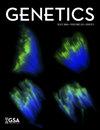杂合性改变了面包酵母中 Msh5 与减数分裂染色体的结合。
IF 3.3
3区 生物学
引用次数: 0
摘要
减数分裂交叉是由程序DNA双链断裂(DSB)启动的。Msh4-Msh5异源二聚体是一种进化保守的错配修复相关蛋白复合物,它通过稳定链侵入中间体和霍利迪连接等联合分子结构来促进减数分裂交叉。利用面包酵母 Saccharomyces cerevisiae(SK1)的同基因株进行的体内研究表明,Msh4-Msh5 复合物与 DSB 热点、染色体轴和中心粒相关联。许多生物都有杂合基因组,这些杂合基因组会通过含有错配序列的杂合双链排斥作用影响链侵入中间体的稳定性。为了研究杂合背景下 Msh4-Msh5 的功能,我们在快速孢子化杂交 S. cerevisiae 菌株(S288c-sp/YJM789,含有来自 SK1 的孢子化增强 QTLs)中进行了 ChIP-Seq 分析,使用 SNP 信息来区分来自同源染色体的读数。总体而言,该杂交品系中的 Msh5 定位与同源品系(SK1)中的定位相似。然而,在高杂合度区域,Msh5 的相对水平降低了,这表明高错配密度降低了与 Msh4-Msh5 结合的重组中间体的水平。与同源株(SK1)相比,杂交背景中的 Msh5 峰值也更宽。我们通过检测含有双亲 SNP 的嵌合序列读数,确定了含有异源双链 DNA 的区域。Msh5结合的DSB热点与含有嵌合DNA的区域重叠,这与Msh5结合到含有杂合双链的重组中间体是一致的。本文章由计算机程序翻译,如有差异,请以英文原文为准。
Heterozygosity alters Msh5 binding to meiotic chromosomes in the baker's yeast.
Meiotic crossovers are initiated from programmed DNA Double Strand Breaks (DSBs). The Msh4-Msh5 heterodimer is an evolutionarily conserved mismatch repair related protein complex that promotes meiotic crossovers by stabilizing strand invasion intermediates and joint molecule structures such as Holliday junctions. In vivo studies using homozygous strains of the baker's yeast Saccharomyces cerevisiae (SK1) show that the Msh4-Msh5 complex associates with DSB hotspots, chromosome axes, and centromeres. Many organisms have heterozygous genomes that can affect the stability of strand invasion intermediates through heteroduplex rejection of mismatch containing sequences. To examine Msh4-Msh5 function in a heterozygous context, we performed ChIP-Seq analysis in a rapidly sporulating hybrid S. cerevisiae strain (S288c-sp/YJM789, containing sporulation enhancing QTLs from SK1), using SNP information to distinguish reads from homologous chromosomes. Overall, Msh5 localization in this hybrid strain was similar to that determined in the homozygous strain (SK1). However, relative Msh5 levels were reduced in regions of high heterozygosity, suggesting that high mismatch densities reduce levels of recombination intermediates to which Msh4-Msh5 binds. Msh5 peaks were also wider in the hybrid background compared to the homozygous strain (SK1). We determined regions containing heteroduplex DNA by detecting chimeric sequence reads with SNPs from both parents. Msh5 bound DSB hotspots overlap with regions that have chimeric DNA, consistent with Msh5 binding to heteroduplex-containing recombination intermediates.
求助全文
通过发布文献求助,成功后即可免费获取论文全文。
去求助
来源期刊

Genetics
生物-遗传学
CiteScore
6.20
自引率
6.10%
发文量
177
期刊介绍:
GENETICS is published by the Genetics Society of America, a scholarly society that seeks to deepen our understanding of the living world by advancing our understanding of genetics. Since 1916, GENETICS has published high-quality, original research presenting novel findings bearing on genetics and genomics. The journal publishes empirical studies of organisms ranging from microbes to humans, as well as theoretical work.
While it has an illustrious history, GENETICS has changed along with the communities it serves: it is not your mentor''s journal.
The editors make decisions quickly – in around 30 days – without sacrificing the excellence and scholarship for which the journal has long been known. GENETICS is a peer reviewed, peer-edited journal, with an international reach and increasing visibility and impact. All editorial decisions are made through collaboration of at least two editors who are practicing scientists.
GENETICS is constantly innovating: expanded types of content include Reviews, Commentary (current issues of interest to geneticists), Perspectives (historical), Primers (to introduce primary literature into the classroom), Toolbox Reviews, plus YeastBook, FlyBook, and WormBook (coming spring 2016). For particularly time-sensitive results, we publish Communications. As part of our mission to serve our communities, we''ve published thematic collections, including Genomic Selection, Multiparental Populations, Mouse Collaborative Cross, and the Genetics of Sex.
 求助内容:
求助内容: 应助结果提醒方式:
应助结果提醒方式:


